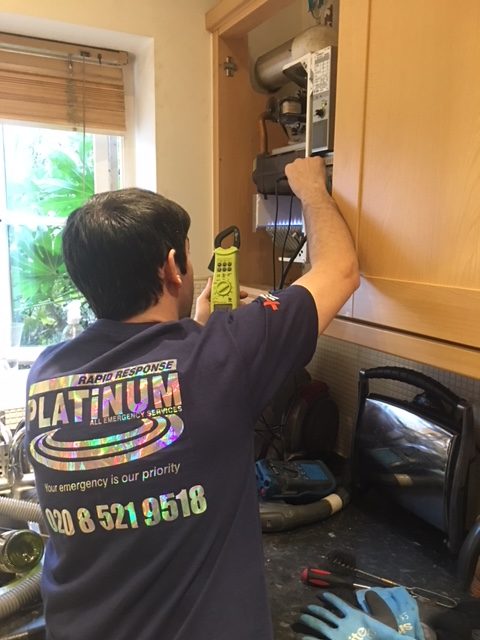How to get your boiler & heating system ready for winter?
If I had a pound every time a client said to me “I did not know we should have our boiler serviced annually”. The fact is 98% do not know the need to service even though there are many benefits to servicing and staying on top of your boiler and heating system. This post is to help you out. Some of the tips you will find below you can even check out and do yourself, saving you money.
For most of us, we have one white box on a wall, which is our boiler somewhere in our house or outhouse that produces both hot water on demand as well as heating. These types of boilers are referred to as combination boilers. Now I know because I work as a plumbing and heating engineer in Walthamstow, East London that some of you are still rocking older systems, which we refer to as either an older gravity feed system, with a system boiler or perhaps you have a shiny newer style system that is mains fed without the need for any feed and expansion tanks with a system boiler. So without trying to confuse people for the most part I shall be sticking to combination boilers because that’s what most homeowners have in 2019. If anyone has any questions on different types of systems please feel free to ask, I will try my best to answers these.
Winter Ready tip 1
Service your boiler. It really is that simple after all most of us service our cars! Now there are many benefits that come with having an industry qualified plumbing and heating engineer servicing your boiler annually. I state the top two reasons from the customers perspective as these are the two reasons customers can easily relate to. (1) Safety, (2) Saving Money.
(1) Safety
In the United Kingdom, all plumbing and Heating Engineers that work on gas-fired boilers are required to be licensed. The current licensing body is called Gas Safe who took over the registration for gas safe registered engineers from an organisation called Corgi in 2009. So, in short, there is one important safety aspect here that is, if you are not licensed in the United Kingdom you can not work on any gas-fired appliance which includes installations, servicing and repairs. I will write another post about this in more detail but in short, every gas engineer that touches a boiler must to by law to check the following.
(1) Flue
(2) Air
(3) Gas
(4) Safety
FAGS for short. This may seem like a short list but in practice its a fair amount of checking and testing which takes time to complete. It should be noted that if a gas-fired boiler or any other gas-fired appliance is in a rented property then there is a legal requirement to complete an annual gas safety certificate, often referred to as a CP12, which is in addition to an annual boiler service. It is sad to say even in the United Kingdom we still have far too many preventable deaths each year from poorly maintained gas appliances. Here is a great little resource if you live in the UK to see how safe is the area where you live. As your boiler gets used the most throughout winter it is an optimum time to have it serviced to keep you and your family safe.
(2) Saving Money
Having your boiler serviced will save you money!
A large number of gas-fired combination or system boilers still require an engineer to reset the burner pressures both max and minimum during any servicing procedures. 9 out of every 10 boilers I service require adjustments to be made because the burner pressure is too high. In short, you are burning more gas than required to achieve the exact same outcome of heating your home or hot water.
Burning more gas than needed through a boiler is exactly the same to me as burning money, after all, gas is not cheap!
Heating Controls
For the most part, heating controls for either hot water or central heating are integrated into a combination or system boiler. For some of you, you might even have external controls, in addition to the controls on your boiler. I do intend at some point to write a separate blog just covering heating controls but for now please read below to save even more money.
Now if you have a professional heating engineer servicing your boiler he or she should ensure you are using the boiler correctly and discuss your family’s needs as part of servicing to ensure you are getting the most out of your boiler regardless if its a combination or system boiler.
I can honestly say most clients I attend to are not using the boiler they have installed to its optimum level to save them money. Modern boilers are super efficient if used correctly. I often reflect on this and think for most of us as long as it is switched on its ok. Let me ask you all this one question. How many of you fill your cars with premium fuel and how many of you use regular fuel? Do we even believe the oil companies hype that claims that premium gas makes your car go further and your engine last longer? Yeap I don’t believe you can replicate lab test for real life living, but here is a little-known fact.
Simply turning down your controls on both your hot water and heating a one-degree difference could save you a huge £75 per year per degree and 340kg carbon dioxide and saving the planet at the same time, feel better now. It is that simple, ta-da. If you understand your controls you can start saving money from today by adjusting them yourself. Imagine being able to turn them down 3 degrees a year that is a potential saving of £225.
Winter Ready tip 2
All combination boiler’s, as well as most modern system boiler’s, are pressurised. This means they often have a pressure gauge either mounted underneath the boiler or on the boiler it’s self. Sometimes the boiler pressure gauge is accessed through the LCD panel on the boiler and has no external gauge. If you are unsure read the manual for your specific boiler as well as users instructions.
This gauge should be kept an eye on throughout the year as it tells you quite a lot about how your system is doing. For most systems, the gauge is read in BAR and should always be read when your system is cold and read around 1.3 BAR. Most boilers will refuse to work if this pressure falls below 1 BAR. A pressure gauge should rise as water in your system heats up but not too much. If you notice the gauge rising above 2.5 BAR it is time to call a heating engineer in as this is an indication of a problem within your system.
Important note If you decide to bleed your radiators please see next tip, then your system pressure will need topping up.
Winter Ready tip 3
Bleeding radiators – In isolation sounds quite an easy task but beware so many of our clients that attempt to bleed their radiators get into problems. This is primarily thanks to YouTube videos that explain things in a perfect environment but not well enough about common and uncommon issues you may encounter. Please, please, if you are not confident in bleeding radiators call a local plumbing and heating engineer.
Over time radiators in all heating systems do not heat up across the full surface area of the radiator causing the system to perform less efficiently and take longer to heat a home causing waste. Once these types of systems are bled they require the system to be re-pressurised.
When bleeding radiators there is a common misconception that we are letting out air. This is only partly true and is largely dependant on the condition of the heating system and water. Although radiators do need bleeding from time to time you could be letting out hydrogen gas and not air. If you are in a position of having to bleed radiators more than once a year you could have corrosion building up fast within the heating system. This will eventually lead to disruption and expensive repair bills.
Although all heating systems do corrode over time the process is slowed by plumbing and heating engineers using chemicals to treat and maintain the heating system. Bleeding and checking radiators always form part of our boiler servicing and should also be covered by any decent heating engineer within their servicing
If you are still with me and want to attempt bleeding the system yourself, you could save some pennies. As above always perform any system bleeding when the system is cold. Always have to hand a couple of old towels, some tissues and a good quality radiator bleed key. Start at the top of the property and bleed one radiator at a time. Opening and closing the bleed nipples on each radiator before moving onto the next. It may become necessary to replace the pressure in your system during the bleeding process of the radiators or afterwards. As I have stated above you are looking to maintain a pressure of 1.3 BAR.
Apart from causing leaks, where none existed before or not, understanding how your system works can lead to problems. Plumbing and Heating can be complex and the best of us run into difficulties from time to time. My advice, check everything twice before and after so you can eliminate mistakes and above all take your time!
Thank You
If you read this far thank you for taking the time to stop and read. If you have any questions please leave a comment. If you think I missed anything please also comment. If you would like me to post about something specific leave your ideas below.


I recently moved to a new house, and I need a heating system installed before the season turns cold. It’s good that you mentioned how having a professional service your boiler regularly will help you save money in the long run since it’ll keep it running efficiently. I’ll be sure to hire trusted professional services for my heating installation.
I appreciate you pointing out the importance of getting the boiler checked before winter. As you said, this is to avoid burning more gas than necessary. My husband and I do not know how to tell if the burner pressure to high, so I guess this tip applies to us. It might be in the middle of winter already, but it’s not too late to get the boiler checked.
Thanks for stopping by. Never too late to have your boiler serviced, even in the middle of winter. Just make sure you use a qualified Gas Safe Registered (GSR) engineer if in the UK. Point to note only a GSR can work on boilers, so testing boiler pressures is not something you can do or are allowed to do!
All the best James
I’m delighted I stumbled upon your blog; it’s filled with useful advice for getting my boiler ready for the cold season. It’s great that so much information that can help us all is readily available. I appreciate you taking the time to write such an insightful piece.